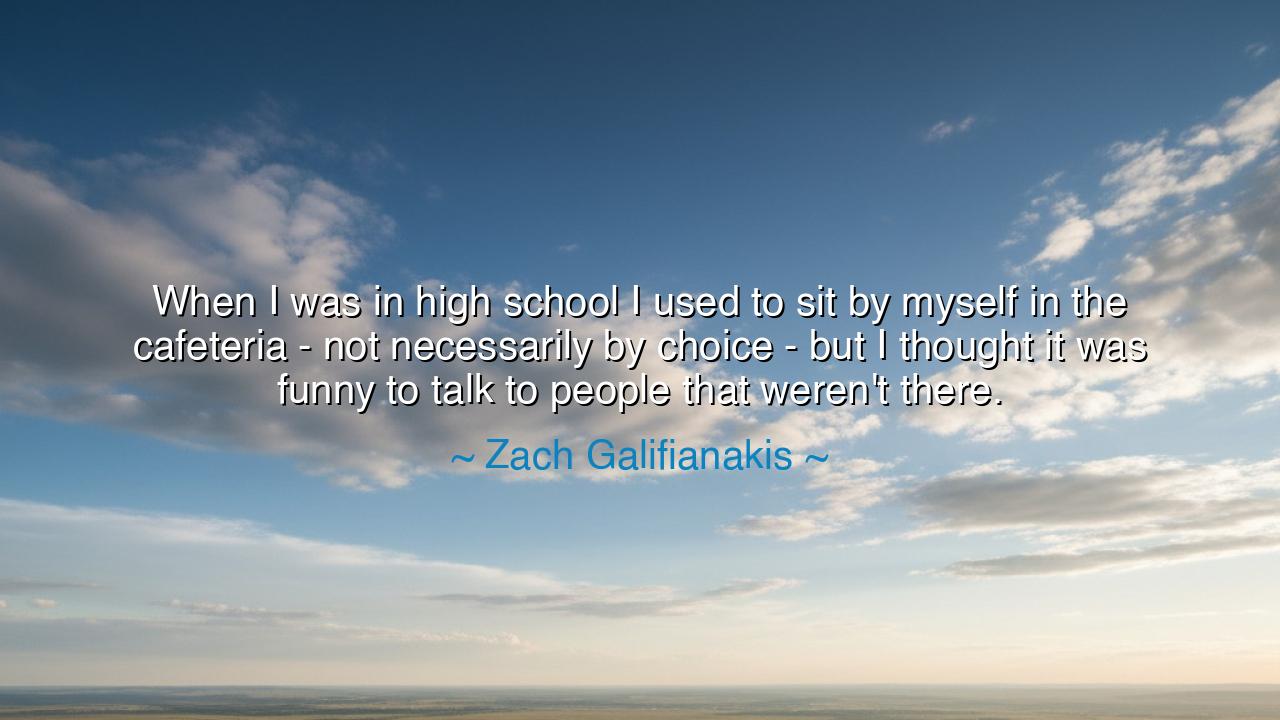
When I was in high school I used to sit by myself in the
When I was in high school I used to sit by myself in the cafeteria - not necessarily by choice - but I thought it was funny to talk to people that weren't there.






When Zach Galifianakis said, “When I was in high school I used to sit by myself in the cafeteria — not necessarily by choice — but I thought it was funny to talk to people that weren’t there,” he was not simply recalling an odd adolescent memory; he was unveiling a timeless truth about the power of imagination, humor, and solitude. In his words lies both melancholy and triumph — the picture of a lonely boy who, rather than surrendering to despair, turned his isolation into comedy. What could have been an image of exclusion became one of creativity. His humor was not a mask for pain, but a transformation of it — the alchemy of the outsider, who makes art out of absence and laughter out of silence.
The origin of this thought springs from Galifianakis’s own early life — a young man who would one day become one of the most distinctive comedians of his time. In those high school days, when laughter was currency and belonging a fragile kingdom, he found himself on the margins. Yet, instead of retreating into bitterness, he discovered that the imagination could fill an empty table as surely as friends could. Talking to “people that weren’t there” was not madness; it was an act of defiance — a way of saying, “I may be alone, but I am not without company.” It was the first spark of the unique comedic vision that would define his art — a humor that finds light in awkwardness, and poetry in absurdity.
The ancients would have understood this gesture well. The philosopher Diogenes of Sinope, often mocked as the “madman of Athens,” lived in a barrel and spoke to those who scorned him as though they were the fools, not he. He conversed with statues to accustom himself to rejection. To the world, he appeared ridiculous, yet through his strangeness, he revealed deeper truths about pride, vanity, and freedom. Like Diogenes, Galifianakis’s humor arises from nonconformity — the courage to embrace one’s difference rather than hide it. For both, what others saw as loneliness or madness was, in truth, independence of spirit.
There is also a profound lesson here about the creative soul. Many of the world’s great artists and thinkers began in solitude — not by choice, but by fate. The young Vincent van Gogh walked alone through fields, painting the light that only he could see. The writer Emily Dickinson, withdrawn from society, found in her isolation a world vast enough for eternity. Likewise, Galifianakis’s imaginary conversations were the seeds of a creative vision — a rehearsal for the humor that would one day make millions laugh. For creativity often begins in moments when one must invent company, when the mind, denied external companionship, begins to dance with its own shadows.
In his laughter, too, there is healing. To speak to “people who weren’t there” and to find it funny — this is not despair, but wisdom disguised as play. The ancients called this kind of laughter “divine folly,” the laughter of those who see through life’s illusions. It is the laughter of Socrates, who knew that to be wise is often to seem foolish. By finding humor in his solitude, Galifianakis was not escaping reality — he was reframing it. He transformed rejection into performance, invisibility into visibility. What began as self-entertainment became self-discovery, and through that, self-empowerment.
Yet his quote also carries a quiet sadness — the recognition that laughter can be born of longing. To sit alone in a cafeteria is to know the sting of separation, the ache of being unseen. But in that moment, Galifianakis found not despair, but agency. He refused to let others define his worth by their attention. Instead, he became his own audience, his own friend, his own stage. This is the essence of resilience — the ability to create joy when none is offered, to find meaning when the world gives you none.
And so, dear listener, let this be your lesson: if you ever find yourself alone, let your imagination keep you company. Speak to the empty seat beside you, if you must — for there is wisdom in such play. The world belongs not only to those surrounded by friends, but to those who can stand alone and still laugh. Like Galifianakis, learn to make light out of loneliness, to turn your strangeness into strength. For humor is not merely entertainment; it is survival, it is art, it is the flame that burns in the solitary heart.
Thus, Zach Galifianakis’s reflection becomes an ancient parable for modern times — that solitude, when met with creativity, becomes not a curse but a crucible. His teenage self, speaking to invisible friends, was in truth speaking to eternity — to all who have ever felt unseen, unheard, or misunderstood. His laughter was a quiet declaration of freedom: that even in silence, the soul can sing.






AAdministratorAdministrator
Welcome, honored guests. Please leave a comment, we will respond soon